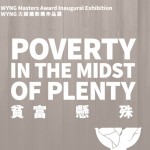Poverty in the Midst of Plenty
 Hong Kong continues to rank among the most successful financial and commercial centres in the world. Its economy in 2012 had expanded by more than 53 per cent since 1998. The government’s reserves are remarkably high by international standards and have continued to climb.
Hong Kong continues to rank among the most successful financial and commercial centres in the world. Its economy in 2012 had expanded by more than 53 per cent since 1998. The government’s reserves are remarkably high by international standards and have continued to climb.
This prosperity has benefitted only a small and declining proportion of it people. Income inequality is among the worst in the world and has deteriorated significantly over the last 20 years. Poverty has become a prominent feature of life in Hong Kong for the first time since the 1950s.
“Poverty in the Midst of Plenty” is a two-year research project which asks: who is to blame and why does Hong Kong tolerate this shameful situation? Its findings are to be published in autumn 2013.
Shameful Policies
In 2005, over a million individuals (15 per cent of the population) were classified officially as living in poverty. The blame for this shameful situation belongs, almost entirely, to the serious misconceptions and miscalculations of official policy-makers and their business ‘partners’ throughout the last 20 years. In addition, the struggle for the survival of Hong Kong’s unique way of life has taken priority over social advocacy.
Tung Chee Hwa wrongly believed that Hong Kong was no longer competitive and that budget austerity was the only remedy. In fact, labour productivity has outstripped most advanced countries in this century and has risen three times faster than wages. Tung’s economic strategy undermined consumer and investor confidence and prolonged the recession that started in 1998. His successor Tsang Yam-kuen’s response to the deteriorating environment faced by Hong Kong’s manufacturing base in Guangdong from 2006 was costly and ineffective. Both men were committed to privatising and outsourcing public services. This policy did not increase either quality or efficiency and created new opportunities for unfair and unlawful treatment of the work force. The privileged consideration given to business interests proved wasteful and permitted misuse of public funds and facilities.
The needy and vulnerable suffered overt discrimination. The elderly who had to depend on social security were depicted as the victims of unfilial offspring, and the unemployed drawing CSSA benefits were stereotyped as shiftless spongers on the state. In fact, a dependency culture did not exist. The proportion of the elderly population on social security has never exceeded 20 per cent, and the proportion of the unemployed on social security has consistently been below 25 per cent.
Victims of Austerity
Since 1998, the community’s access to public housing and the social services has deteriorated. Public spending on housing has fallen by more than half. The costs of schooling have increased. So have medical fees. Price rationing limited access to modern medication for cancer and other seriously ill patients, as well as for the mentally ill.
The elderly and the disabled have faced distressing delays for admission to urgently needed facilities.
- Almost 23,000 elderly men and women died between 2007 and 2011 while waiting for residential care.
- The average delay in admission to residential facilities for persons with severe disabilities has ranged from three to six years.
Legacy of Past Policies
Current poverty begins with the policy errors of the past. Since the 1960s, senior officials have cooperated with the business community to block the introduction of schemes which could be classified as social insurance. The Mandatory Provident Fund (MPF) was only introduced in 2000 and thus will not finance a comfortable retirement for the average employee for decades. Unlike almost all advanced economies, Hong Kong has no universal pension, no community-wide health or unemployment insurance.
The educational system has struggled in this century to overcome a shortage of qualified graduate staff and adequate facilities. The shortfalls were the inevitable outcome of postponing the introduction of free, compulsory schooling until 1978.
Worst of all is housing. The government’s retreat from this sector since 2002 has left the community at the mercy of property developers. Supply is inadequate. The housing stock suffers from extensive dilapidation and neglected maintenance. Low-income families and socially-disadvantaged individuals are forced to live in buildings which are often dangerous and squalid. Slums are increasing faster than in other advanced world cities.
The New Poor
Hong Kong now has an ageing population and a post-industrial economy. In the absence of social insurance, the community must fund long-term financial and medical care for the elderly. In this post-industrial economy, the jobs available to those with limited schooling and to persons with disabilities have shrunk. They too will require long-term financial support and social services.
It is not only individual members of these groups who face poverty. Family-based means testing and the government’s drive to expand the private sector’s share in providing social services puts relatives under severe pressure to exhaust their savings and go into debt to cover the (increased) fees and charges.
Thus, from one decade to the next, the disabled and the disadvantaged are deprived of dignity and denied compassion. The eradication of Hong Kong’s shameful poverty will only start in earnest when the government recognises the distress imposed on the needy and the vulnerable by its flawed policies.
Leo F. Goodstadt was the Hong Kong government’s chief policy adviser from 1989 to 1997. As the first Head of its Central Policy Unit, he was responsible for strategies dealing with a range of complex economic, political and social issues.
中文譯本︰
盈豐物茂說貧窮
香港一直是全球最成功的金融及商業中心之一。香港的經濟體系,自1998年至2012年,實質增長超過百份之五十三。以國際標準來說,香港政府財政儲備極其龐大,而且還在不斷增長。
這些繁榮成果實際上只有少數人可以受惠,比例上這「少數人」還愈來愈少。過去二十年,收入不均是世上最棘手的難題,懸殊情勢每況愈下。在香港,貧窮自五十年代起已經是我們生活的一部份。
「貧富懸殊」是為期兩年的研究項目 ; 我們的核心問題是:誰應為此負責?為何香港要容忍這種讓人羞愧的狀況?這個研究項目由本人負責,研究報告將於2013年秋天發佈。
可恥的政策
在2005年,超過一百萬人-相等於百份之十五的香港人口-被官方界定為貧窮人口。歸根究底,過去二十年政府決策階層及其商界「伙伴」需要為此負上絕大部份的責任;他們看待貧窮的觀念有錯誤,他們估算貧窮的方法也錯誤;再加上香港流行的一套「只問生存,社會關懷干卿底事?」的獨有生活態度,惡劣的貧窮境況便日趨嚴峻。
前特首董建華認為,香港經濟已失去了競爭力,並且必需以緊縮政府開支的方式來挽救,這是大錯特錯的做法。事實上,香港工人的生產力在廿一世紀已經超越了許多先進國家,而且更以三倍的速度高於工資的增長。董的經濟政策只削弱了消費者及投資者的信心,並且延長自98年開始的經濟衰退期。接任的曾蔭權也一樣。香港的工業生產基地廣東於06年開始出現衰退,曾蔭權提出的應對措施既昂貴又不濟。兩人同樣迷信於私有化及將公共服務外判,不但未能改善公共服務的質素及效率,而且更帶來更多不公平不合法的勞工問題。相反,政府處處優待商界,卻浪費公帑,造成公共設施被合法濫用的問題。
貧窮及弱勢者所受的歧視是極嚴重的。老人若要依賴社會保障生活,子孫會被怪罪為不孝。失業人士領取綜援,卻被標籤為大食懶寄生蟲。事實上,在香港依賴文化並不存在,依賴社會保障為生的老人家從未超逾領取社會保障總人數的百份之二十,而依賴社保生活的失業人口長期以來亦低於百份之二十五。
緊縮政策的受害人
自98年起,普羅市民享用公營房屋及公共服務的機會愈來愈少。政府投入在房屋方面的公共開支縮減了一半以上,市民需要支付的教育費用卻愈來愈昂貴。醫療方面亦然;醫療服務的市場化,使癌症、罹患嚴重惡疾、甚至精神病患者,均難於取得現代醫藥的有效治療。
有緊急需要的老人家及殘疾人士,他們所面對的耽擱則更令人氣餒。
- 在2007至2011年間,接近二萬三千名老人家於輪候安老院舍宿位時過身;
- 嚴重傷殘人士輪候院舍照顧服務平均要耽擱三至六年。
昔日政策的影響
今日的貧窮問題,均源於昔日的錯誤政策。六十年代起,政府高層一直與商界緊密合作,以阻撓社會保險制度的出現。直至二千年,香港才正式推行強制性公積金(強積金);期望強積金能為打工仔提供舒適的退休保障,似乎還是漫漫長路。跟許多其他先進的經濟體系相比,香港更沒有全民退休保障、沒有全民的醫療保障、甚至沒有失業保險。
1978年政府才開始推行免費強逼教育,但一切已來得太遲,今個世紀我們的教育制度均要承受師資及設施短缺等種種惡果。最惡劣的是房屋政策 :政府自2002年起無限期擱置興建居屋,使到香港市民在房屋問題上任由大地產商所魚肉。房屋供應長期不足,剩下的樓宇既破爛不堪又欠缺維修,低收入家庭及弱勢人士被逼居住在危險且環境惡劣的舊樓之中,結果是今日香港貧民窟增長的速度,比世上任何一個先進城市都要快。
新貧窮人口
今日香港所面對的,是人口老化及後工業時期的經濟。在欠缺社會保險的情況下,香港社會必須要為老人家長遠的財政及醫療需要負責。在後工業時期的經濟體系裡,能夠給予低教育水平以及殘疾人士的工作機會愈來愈有限,這批人口同樣需要長期的財政援助及社會服務。
在這個階層中,貧窮已不是個人的問題。政府採納以家庭為入息審查的基礎,再加上將社會服務私有化,均使到貧窮人士為應付龐大的生活開支而耗盡積蓄,甚至債務纒身,周邊的親朋戚友均同樣因此而面對嚴峻的壓力。
十年又十年,香港的弱勢社群已經失去了尊嚴、受歧視、得不到憐憫。貧窮問題已是香港的一塊恥辱碑,要除掉這塊碑,香港政府必須先認清其錯誤政策對貧弱者所造成的創傷。正視貧窮問題的根源,才可讓香港重上正軌。
顧汝德於89至97年間,擔任港英政府首席政治顧問。作為中央政策組首位首席顧問,顧汝德於任內需要處理一連串經濟、政治及社會議題,就這些議題向政府出謀獻策。
Credit: WYNG Masters Award Inaugural Exhibition – Poverty In the Midst of Plenty Catalogue